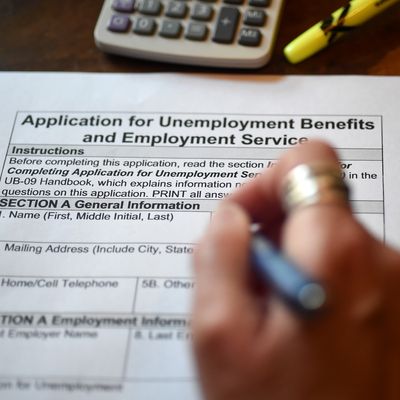
Since the onset of the coronavirus pandemic in the United States, 26.5 million Americans have lost their jobs. If all of the workers who’ve filed jobless claims in recent weeks are still seeking work (and thus, qualify as “unemployed” in the Labor Department’s nomenclature), then America’s unemployment rate is likely hovering around 20 percent — or double its post–financial crisis peak.
Last week’s round of layoffs was a bit smaller than its predecessors, with “only” 4.43 million workers applying for initial unemployment benefits. Given the logistical headaches and backlogs at unemployment insurance offices around the United States, the actual number of out-of-work Americans may be higher than the topline data suggest.
Regardless, this is the worst labor market the U.S. has witnessed since the Great Depression. Should current trends continue, we may well exceed that era’s peak unemployment rate of 24.9 percent in the coming weeks. For now, the social consequences of the present crisis are less dire than those of the early 1930s only because the American social safety net — however patchy and threadbare — is more robust today than it was then. And the $600 a week boost to federal unemployment benefits that Democrats pushed into the CARES Act (over Republican opposition) will spare millions of Americans from suffering catastrophic losses of income.
But the fact that the welfare state has rendered the present recession less devastating than those of the pre–New Deal era does not weaken the case for further intervention — it strengthens that case. There is no reason for Americans to accept the present levels of unemployment and economic hardship as inevitable. Rather, this week’s surge in jobless claims is, in no small part, a product of Congress’s inadequate support for employers, states, and cities.
The Paycheck Protection Program (PPP) — which provides small businesses with fully forgivable loans, so long as they forgo layoffs during the pandemic — has succeded in keeping more than 1 million firms solvent, and preserved a great many jobs. But instead of making the PPP an entitlement program like unemployment insurance, in which all eligible firms are entitled to the policy’s benefits, Congress has opted to impose tight, arbitrary caps on the amount of funding the program can disperse. In a context where virtually every business in the economy is reeling from the impact of a pandemic and social distancing, the initial $350 billion appropriation was exhausted in a mere two weeks. The additional $320 billion that Congress allocated to the program this week is unlikely to last much longer. And since these funds are distributed through private banks on a first-come, first-served basis, well-connected firms — such as the franchises of national restaurant chains — have a leg up on the smallest and most vulnerable businesses. This reality has spurred a backlash against chain restaurants that secure PPP loans. But such outrage is utterly misdirected. There are a lot more workers in the U.S. than there are small-business owners, and the former tend to be more economically vulnerable than the latter. There is no reason why we should care more about preserving the job of a worker who stocks shelves at a mom-and-pop hardware store than one who serves burgers at a Shake Shack. The problem isn’t Potbelly’s; it’s Congress. Out of a superstitious terror of deficits, lawmakers on Capitol Hill are allowing mass business failures that will deepen the recession, delay the recovery, and plausibly produce an even larger increase in the long-term national debt than providing open-ended support to all employers would.
Congress’s most egregious failure, however, has been its refusal to provide more than $150 billion in aid to states and cities. At present, state and local budgets are exploding, as the coronavirus massively increases costs on municipal governments (which bear much of the responsibility for funding pandemic response, health-care, and jobless benefits), while obliterating their revenue. Absent federal aid, these developments will force states and cities to slash spending and jobs, directly undermining the ostensible purpose of federal stimulus spending. Congress can avert this outcome. Unlike states and cities, the U.S. federal government can borrow money at near-zero interest rates and print dollars in unlimited quantity. With deflation posing a greater risk than inflation at present, there is no economic reason for Congress to condemn municipal governments to fiscal crisis. It is only conservative Republicans’ ideological desire to gut blue states’ pensions and social spending that is obstructing the disbursement of such aid. If Mitch McConnell persists with such obstruction, then he may well make America experience a great depression again.






























